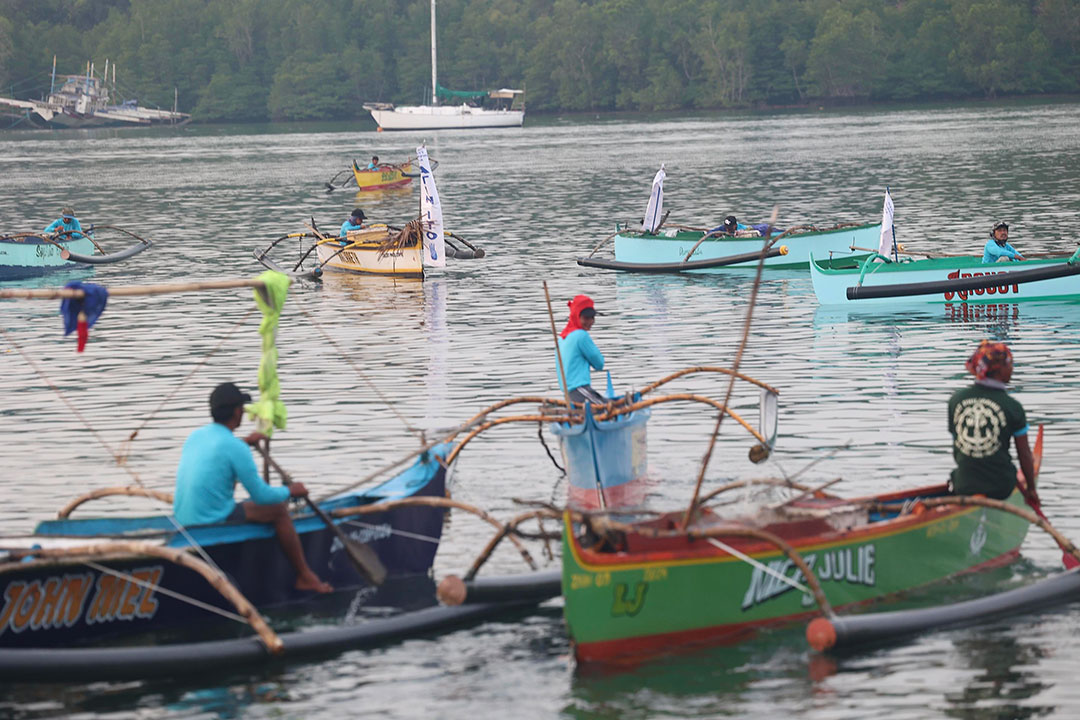Philippines sends 3 vessels to protect civilian convoy to Scarborough Shoal

By Kyle Aristophere T. Atienza, Reporter
THE PHILIPPINES has sent three coast guard vessels to ensure the safety of a civilian flotilla sailing to a shoal in the South China Sea, where Manila and Beijing have been embroiled in heated standoffs over competing claims.
The three-day mission to hand out provisions to fishermen anchored at the disputed Scarborough Shoal is being led by a group called Atin Ito (This is Ours), along with five commercial fishing vessels, organizers said.
About 100 smaller fishing boats will also join the initial part of the trip.
The coast guard was not part of the civilian mission that sailed on Wednesday, but it would provide safety and security to the civilian volunteers, Philippine Coast Guard (PCG) spokesman Jay Tristan Tarriela told reporters.
A PCG aircraft was also deployed to monitor the situation at Scarborough Shoal, he said.
Chinese state broadcaster CCTV reported that the Chinese Coast Guard recently held routine drills at the shoal.
Atin Ito led a similar mission in December to deliver supplies to troops stationed at Second Thomas Shoal, but it cut short its journey due to what it described as shadowing and harassment by Chinese Coast Guard ships.
The Chinese Embassy in Manila did not immediately reply to requests for comment on the civilian mission. It has maintained China has “indisputable sovereignty over the South China Sea Islands and adjacent waters.”
Located inside Manila’s exclusive economic zone, the Scarborough Shoal is coveted for its bountiful fish stocks and a stunning turquoise lagoon that provides a haven for vessels during storms.
China seized it in 2012 after a standoff with the Philippines, and it has since kept a constant deployment of coast guard and fishing trawlers, some accused by Manila of being maritime militia.
China has not acknowledged the presence of militia in the South China Sea.
“China’s actions in the West Philippine Sea (WPS) reveal not strength, but a glaring weakness,” Rafaela David, a co-convenor of Atin Ito, said in a statement, referring to areas of the South China Sea within the Philippines’ exclusive economic zone (EEZ). “When it resorts to intimidating small, civilian fishing vessels with military might, it showcases a narrative built on fear rather than legitimate authority.”
Atin Ito said it had installed symbolic buoys within the Philippine EEZ containing the words “WPS, Atin Ito.”
China claims almost all the South China Sea, including parts claimed by the Philippines, Brunei, Malaysia, Taiwan and Vietnam.
A United Nations-backed tribunal based in the Hague in 2016 voided China’s sweeping claims in the South China Sea for being illegal.
MIDTERM ELECTIONS
Meanwhile, Mr. Tarriela said the South China Sea dispute would likely become a major issue in Philippine midterm elections next year, adding that a victory for pro-China politicians could weaken Philippine sovereignty.
Pro-China bloggers and influencers appear to be stepping up their online campaign to promote Chinese interest ahead of the election campaign period that is several months away, he said.
He noted that due to a transparency strategy launched by the Philippine government last year to expose Chinese aggression at sea, the South China Sea dispute has become more popular among ordinary Filipinos.
“With the right information that we are providing to the Filipino people, we can expect that the 2025 elections will have produced responsible voters,” he said.
Mr. Tarriela said efforts to modernize the Philippine Coast Guard and Armed Forces, as well as the budgets for the country’s territorial defense are at stake in 2025.
The midterm elections are critical to the future of the country’s claims in the waterway since it involves the Legislature, which “holds the power of the purse,” said Joshua Bernard B. Espeña, who teaches foreign policy at the Polytechnic University of the Philippines.
“The genuinely pro-Philippine candidates should include discussions on building a credible indigenous defense industry and enhancing fiscal discipline in the nitty-gritty of annual defense budgets in their legislative agenda if the Comprehensive Archipelagic Defense Concept will be implemented,” he said via Messenger chat.
Hansley A. Juliano, who teaches political science at the Ateneo, said the midterm elections could either bring in more opposition voices who are anti-China or bring back politicians who are pro-China.
“Ironically, an expansion of the opposition, which may not necessarily be aligned with President Ferdinand R. Marcos, Jr., would be the most beneficial to our current foreign policy realignment assuming the UniTeam has been irreversibly splintered,” he said, referring to the partnership between the President and Vice-President Sara Duterte-Carpio.
“This may also rehabilitate the reputation of the AFP and realign the budgets for modernization in less-contentious branches of the AFP and Interior department such as the Navy, Air Force and Coast Guard,” he said in a Messenger chat.
“Since the Army and police are much compromised by the government of ex-President Rodrigo R. Duterte and their contacts with China, this is a concern.” — with Reuters



